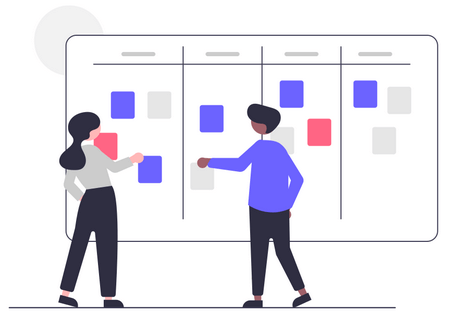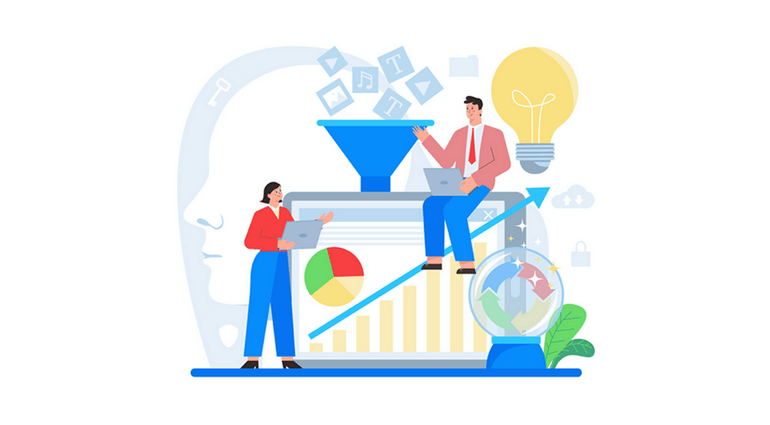Imagine a funnel, wide at the top and narrowing towards the bottom. This is a helpful analogy for visualizing a sales funnel, the journey potential customers take from initial awareness to becoming paying customers.
An optimized sales funnel captures a broad audience at the top (awareness), educates and engages them in the middle (consideration), and compels them to take action (decision) at the bottom, ultimately driving conversions and sales.
However, optimizing a sales funnel can be a complex task. Businesses face challenges in understanding customer behavior, personalization at scale, and targeting the right audience.
Artificial Intelligence (AI) will help you here. AI is revolutionizing sales funnels by offering powerful tools to overcome these challenges and maximize conversion impact. We’ll discuss this further in this article. So, read on for more!
Table of Contents
The Power of AI in Sales Funnels
Let’s explore how AI empowers businesses to understand, personalize, and predict customer behavior for maximum impact.
Data Analysis and Insights

AI excels at analyzing vast quantities of customer data, including website behavior, purchase history, demographics, and social media interactions. This data goldmine holds the key to understanding customer needs and preferences.
AI algorithms sift through this data, identifying hidden patterns and trends in customer behavior, buying journeys, and product preferences.
By equipping you with these data-driven insights, AI empowers you to optimize each stage of your funnel. You can tailor content and messaging to resonate with specific customer segments, address pain points, and ultimately nudge them toward conversion.
Personalization at Scale
Imagine delivering a personalized experience to every single customer. With AI, it’s no longer a fantasy. AI personalizes the customer journey based on individual data.
It analyzes a customer’s browsing history, purchases, and interests to create a unique and relevant experience. This can include tailored content, dynamic offers, and conversational chatbots.
Predictive Analytics
AI doesn’t just analyze the past; it can also predict the future. Powered by AI, predictive analytics analyze customer data to anticipate behavior and identify high-potential leads. This allows you to prioritize resources, tailor sales approaches, and predict churn rates.
By leveraging AI’s predictive capabilities, you can proactively engage with high-value leads, nurture them through the funnel, and ultimately convert them into loyal customers.
AI Applications Across the Sales Funnel

AI offers a toolbox of applications that can optimize each stage of your sales funnel. Let’s explore how AI can transform the customer journey, from initial awareness to final decision.
Awareness Stage
Gone are the days of scattershot advertising. AI analyzes customer data and demographics to pinpoint your ideal audience across platforms.
This allows you to run highly targeted ad campaigns on social media, search engines, and other channels, ensuring your message reaches the right people at the right time.
AI can also help you achieve greater organic reach through content creation and SEO optimization. AI tools can analyze search trends and customer interests to suggest relevant topics for your content.
Additionally, AI can optimize your website content for search engines, increasing your visibility and attracting potential customers organically.
Consideration Stage
Imagine a website that adapts to each visitor. AI analyzes visitor behavior and browsing history to personalize website experiences.
This could involve displaying relevant product categories, showcasing recently viewed items, or suggesting complementary products based on past purchases. This level of personalization fosters a sense of connection and encourages visitors to explore further.
AI chatbots are revolutionizing customer service and lead qualification. These chatbots can answer basic questions, provide product recommendations based on a visitor’s interests, and even qualify leads by gathering relevant information. This frees up your sales team to focus on high-value interactions and conversions.
Furthermore, consider leveraging WooCommerce Product Videos. These videos can visually showcase your products, highlight their features and benefits, and ultimately increase customer engagement and purchase confidence.
Decision Stage
Emails remain a powerful tool in the sales funnel. AI can analyze customer data to personalize email marketing campaigns.
This could involve sending targeted emails with relevant product recommendations, special offers based on browsing history, or abandoned cart reminders. These personalized emails resonate more deeply with customers and nudge them closer to conversion.
Pricing is a delicate dance. AI can analyze customer data and market trends to suggest optimal pricing strategies. This could involve dynamic pricing that adjusts based on real-time demand or personalized offers tailored to specific customer segments.
Using AI to optimize pricing, you can maximize revenue while offering attractive deals to convert customers at the decision stage.
Also, you should use WooCommerce Popup Cart to offer complementary products based on the items already in the cart. This can provide that final nudge towards conversion.
Optimizing Your Sales Funnel With AI: A Step-by-Step Guide

Ready to harness the power of AI and transform your sales funnel? Here’s a roadmap to get you started:
- Step 1: Chart Your Course
Before diving into AI, take a step back. Clearly define your goals for funnel optimization. Once you know your goals, identify your target audience. Understanding these elements will guide your AI implementation strategy.
- Step 2: Collect Data and Analyze
AI thrives on data. Identify and collect relevant customer data from various sources like website analytics, CRM systems, and social media interactions. Once the data is gathered, leverage AI tools to analyze it. Uncover hidden patterns, customer journeys, and areas for improvement across your funnel.
- Step 3: Choose the Right AI Tools
The AI landscape offers a variety of tools to address specific needs. Research and choose the right AI tools that align with your goals and budget.
- Step 4: Test, Refine, and Iterate
Integration isn’t the finish line. Monitor the performance of your AI-powered funnel. Analyze key metrics like conversion rates, customer engagement, and lead quality. Test different AI strategies and iterate based on your findings. AI is a powerful learning machine – the more data it processes, the better it optimizes your funnel for maximum impact.
Conclusion
The integration of AI into sales funnels marks a paradigm shift. AI transforms static funnels into dynamic customer journeys by leveraging data analysis, personalization, and prediction.
This results in a deeper understanding of your audience, a more tailored customer experience, and maximized conversions.
The future of sales funnels lies in the harmonious collaboration between human creativity and artificial intelligence, leading to an era of personalized, data-driven customer experiences that drive success.
Editorial Staff at WP Daily Coupons is a team of WordPress experts led by Peter Nilsson.

